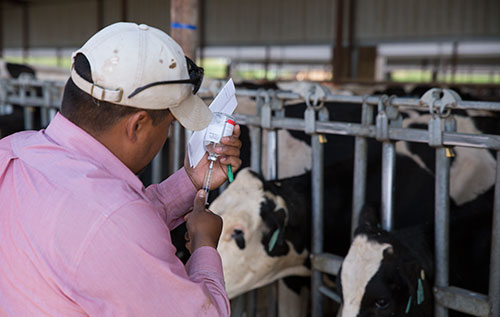
California has long championed public health and environmental issues. It's home to the 9th Circuit Court of Appeals, which is regarded as the most pro-environmental court in the country. And, with the ink drying of one of its most recent bills, California will maintain its progressive public health track record.
This past Saturday, California Governor Jerry Brown signed a bill that sets the strictest government standards to date for the use of antibiotics in U.S. livestock production.
Brown vetoed a weaker bill last year.
"The science is clear that overuse of antibiotics in livestock has contributed to the spread of antibiotic resistance and the undermining of decades of lifesaving advances in medicine," Governor Brown noted in a statement.
The bill (SB 27), which goes into effect on January 1, 2018, will restrict the routine use of antibiotics for disease prevention and bans antibiotic use for growth promotion. Furthermore, it also aims to stop the over-the-counter sale of antibiotics for livestock use. Under the new rules, antibiotics would have to be ordered by a licensed veterinarian.
Additionally, California's Department of Food and Agriculture will be required to monitor antibiotic sales and use. It will also gain the authority to collect information on antibiotic use in livestock production and to develop best practices.
The state's meat and poultry associations stayed neutral on the bill, noted Bloomberg. A mere seven lawmakers voted against it.
Among all states, California ranks third in terms of the value of its meat, milk, eggs and other livestock products.
The legislation comes amid escalating public concern that the overuse of such drugs in animals is contributing to the creation of superbugs. The U.S. Center for Disease Control estimates that nearly 2 million people in the U.S. acquire an antibiotic-resistant infection each year. Nearly 23,000 people die as a direct result.
In 2013, the FDA implemented a voluntary plan to phase out the use of antibiotics for enhanced food production. California's policy is more restrictive than the FDA's guidelines, which don't restrict antibiotic use for disease prevention.
In the U.S., roughly 70 percent of the antibiotics of importance for human medicine are also sold for use in meat and dairy production, noted a recent article from Reuters.
Only time will tell if California's new law will push other states to follow suit.

The author is an associate editor and an animal science graduate of Cornell University. Smith covers feeding, milk quality and heads up the World Dairy Expo Supplement. She grew up on a Medina, N.Y., dairy, and interned at a 1,700-cow western New York dairy, a large New York calf and heifer farm, and studied in New Zealand for one semester.








